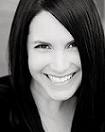Would publication feel the same to you if there was no physical book to show for it?
"It depends on what you mean by the question. :-) At face value, I would answer no, because without a physical book, my journey simply would have been different. For example, I wouldn't have gone with my mom to stalk my book in the stores the first day it came out, and I wouldn't see it on the library shelves. Instead, I'd have spent more time promoting it through online channels. But if the question is actually about whether I think electronic publication is still 'real' publication, then the answer is yes. If a story is published, it's published, regardless of media or format. Now, if you're asking about whether self-publishing an ebook is the same thing as traditional publication, that's a whole 'nother story that we don't have time to get into here!" - Sarah Ockler, author of Bittersweet.
"Surprisingly – since I'm someone who edits an online-only magazine! – it wouldn't feel the same. I think when you're writing and working so much in the realm of the unreal – made-up worlds, made-up people, abstract words on a screen – realizing that you've made something real and physical can be this visceral, amazing kind of shock. I spent a lot of time touching my ARCs when I got them. When I get the real book? I'll probably hug it for three days." - Leah Bobet, author of Above.
"I’m really platform agnostic. I’m about to release my third stand-up album and there’s never been a physical CD, it’s always just a download. So I guess I’m used to it. I’m more concerned with getting my story out there and consumed than how people do it." - Aaron Karo, author of Lexapros & Cons.

"No. I feel very differently about a physical book versus words on a screen. It might be generational." - Ann Stampler, author of Where It Began.

"Definitely not. For me, all the touchstone moments of being an author involve the physical book: Holding it in my hands, seeing (and signing!) my name on the title page, finding my spine on the bookstore shelf. One of the wonders of being a published author is seeing the document you created on your computer transformed into a real world object that other people are willing to pay money for and display in their homes. If there’s no book, just a a file that might as well be a Word document with some fancy formatting, a lot of that wonder, for me, at least, would be gone." - Robin Wasserman, author of The Book of Blood and Shadow.
"I'm assuming you mean e-books, which I guess are the wave of the future. I'm an old fashioned sort of person and still like my physical books. So, for me that physical book is pretty important. There's something magical about seeing my words printed out on paper and bound in a book." - Alissa Grosso, author of Ferocity Summer.
"I don’t think so. There’s something about being able to hold a book in your hands, and more importantly to show it to other people so you can turn to the title page and show them the publisher and say, 'See! I didn’t self-publish!'" - Jennifer Bosworth, author of Struck.
"No. But that doesn’t mean it wouldn’t be wonderful in a different way. Story is story. How we deliver it is being redefined, so I think it’s smart to embrace that change." - Meg Medina, author of The Girl Who Could Silence the Wind.
"Absolutely. I read almost exclusively on my Kindle so I am already on the pixelated book wagon as a reader. And my self-published digital titles are stories I'm very proud of and continue to provide income to me every month." - Gwen Hayes, author of Dreaming Awake.
"Sure. It’s not the book that matters, it’s the story. Folklore ruled before stories were written down. And e-readers have brought reading back for a lot of people who can’t tote big tomes around." - Nina Malkin, author of Swear.


















































Another great insight post - I'm not surprised that most would feel differently about a physical book to an eBook!
ReplyDelete